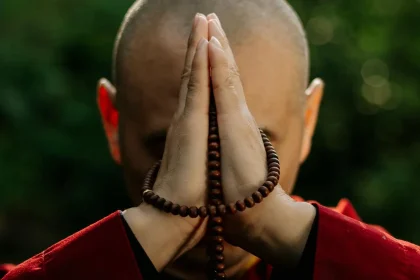Finding a spiritual practice that truly resonates can be a transformative experience. Yet, many people struggle to establish a routine that feels meaningful and sustainable. Whether you’re seeking inner peace, personal growth, or a deeper connection to the universe, building a spiritual practice that works for you is key. Here’s how you can do it.
Start with Self-Reflection
Before diving into any spiritual practice, it’s essential to understand your motivations. Ask yourself why you’re seeking a spiritual practice. Is it to find peace, improve your mental health, or connect with something greater than yourself? Clarity on your intentions will guide you toward practices that resonate with your personal needs.
Take time to reflect on what spirituality means to you. For some, it might be about connecting with nature, while for others, it could be about deepening their faith. Your spiritual practice should align with your values and beliefs. This alignment makes it easier to stay committed and reap the benefits of your efforts.
Explore Different Practices
There are countless spiritual practices to explore, ranging from meditation and prayer to yoga and journaling. Don’t feel pressured to follow a single path—explore different methods and see what feels right.
Try starting your day with meditation. It’s a simple practice that can help you center your thoughts and set a positive tone for the day. You might also consider incorporating journaling as a way to reflect on your thoughts and feelings. Some people find solace in nature walks, where they can connect with the natural world and find inner peace.
One woman I know, Sarah, started her journey with meditation but found herself drawn to yoga. The physical movement combined with mindful breathing helped her feel more connected to her body and spirit. By experimenting with different practices, she discovered what truly resonated with her.
Create a Routine that Fits Your Life
Consistency is crucial when building a spiritual practice. However, your routine should complement your life, not complicate it. Start small and gradually build on your practice.
For example, you might begin with five minutes of meditation each morning. As you grow more comfortable, extend your session or add another practice like journaling or prayer. The key is to make your practice a non-negotiable part of your day without overwhelming yourself.
Consider integrating your practice into existing routines. If you enjoy your morning coffee, use that time to sit quietly and reflect. If you’re an evening person, try ending your day with a gratitude journal. The more natural your practice feels, the more likely you are to stick with it.
Embrace the Journey, Not Perfection
Building a spiritual practice is a journey, not a destination. There will be days when you feel deeply connected and others when you struggle. That’s perfectly normal. What’s important is to show up consistently, even on difficult days.
Remember, there’s no right or wrong way to practice spirituality. What works for one person might not work for another. Your practice is deeply personal and should evolve as you do. Be patient with yourself and allow your practice to grow and change over time.
An example of embracing imperfection comes from a friend named John, who shared how he often felt frustrated when his meditation didn’t bring instant peace. Over time, he learned to let go of expectations and simply be present in the moment. This shift in mindset made his practice more fulfilling and less about achieving specific outcomes.
Connect with a Community
While spirituality is often a personal journey, connecting with like-minded individuals can enhance your practice. Whether through a local group, an online community, or a spiritual mentor, having support can provide encouragement and new perspectives.
Joining a meditation group, for example, can offer a sense of belonging and accountability. Sharing your experiences with others can also deepen your understanding and help you stay motivated.
One community member, Lisa, found that her spiritual growth accelerated when she started attending weekly group meditations. The shared energy and collective intention added a new dimension to her practice, making it more profound and rewarding.
Stay Open and Curious
Spirituality is an ever-evolving journey. Stay open to new experiences, teachings, and practices. What resonates with you today might change as you grow and evolve. Keeping an open mind allows your spiritual practice to be dynamic and responsive to your changing needs.
Curiosity can lead you to discover new aspects of yourself and your spirituality. Whether it’s reading spiritual texts, attending workshops, or exploring different traditions, continuous learning keeps your practice vibrant and engaging.
Integrate Mindfulness into Daily Life
Mindfulness is a powerful tool that can enhance any spiritual practice. By being fully present in each moment, you can deepen your connection to yourself and the world around you.
Practice mindfulness during everyday activities like eating, walking, or even washing dishes. These moments of presence can bring a sense of peace and clarity, turning ordinary tasks into opportunities for spiritual growth.
For instance, a colleague of mine began practicing mindfulness during her morning commute. Instead of getting lost in thoughts or stress, she focused on her breath and the sights around her. This simple shift transformed her commute into a time of calm reflection, setting a positive tone for her day.
Set Intentions, Not Expectations
Setting intentions is a powerful way to guide your spiritual practice. Unlike expectations, which can lead to disappointment if not met, intentions are about directing your energy toward a desired state of being.
Each day, set a small intention for your practice. It could be something like “Today, I intend to be present in all my interactions” or “I intend to approach my practice with curiosity.” These intentions can help you stay focused and aligned with your spiritual goals.
A friend named Emily shared how setting intentions transformed her practice. Instead of expecting specific outcomes, she focused on how she wanted to feel. This shift allowed her to enjoy the process rather than fixating on results.
Reflect and Adjust
Regular reflection is essential to a successful spiritual practice. Take time to evaluate how your practice is affecting your life. Are you feeling more centered, peaceful, or connected? If not, consider adjusting your routine.
Your spiritual practice should serve you, not the other way around. Don’t be afraid to tweak your routine if it’s not meeting your needs. Whether that means trying a new meditation technique, adjusting the time you practice, or seeking guidance from a mentor, staying flexible ensures that your practice remains effective and meaningful.
A Final Thought: Make It Your Own
Ultimately, your spiritual practice should be a reflection of who you are. It’s a personal journey that requires authenticity and self-compassion. Take what resonates, leave what doesn’t, and create a practice that truly works for you.
As you embark on this journey, remember that the goal isn’t to achieve a perfect practice but to cultivate a space where you can connect with your inner self, find peace, and grow spiritually. So, start where you are, stay open to the process, and trust that your practice will evolve in its own time.
What does your spiritual practice look like? Share your experiences or ask questions in the comments below! Your journey could inspire others on a similar path.





